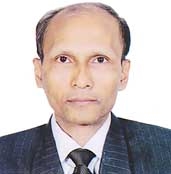
Masum Billah :
The step began in 2017 with the formation of two committees consisting of educationists to present a new curriculum. Now the new curriculum is going to be introduced from 2023. In order to ensure playful learning for the children there will be no terminal examination till grade three. However, pupils’ performance would be assessed on the basis of their classroom activities though its way has not been mentioned. The new curriculum will be piloted in 100 primary and 100 secondary schools. The students of class one and two and the students of grade six and seven will receive new books on new curriculum from the year 2023. In 2024 grade three and four and eight and nine will be brought under new curriculum. By the year 2025 all the students of secondary level will come under this new curriculum and in 2026 eleven class and 2027 twelve class will be brought under it. A cohesion has been maintained to amalgamate the continuity from pre-primary to grade twelve syllabus. From pre-primary to grade three hundred percent assessment will be classroom based while grade four and five will have 60 percent classroom based and 40 percent summative assessment in Bengali, English, Mathematics, Science and social Science. Life skill and livelihood, Digital Technology, Physical and Mental Health safety, Religion and Arts and Culture will have classroom based assessment. In grade nine and ten fifty percent assessment will be school based and the rest fifty percent summative in Bengali, English, Mathematics, Science and Social Science. Other subjects will have classroom based assessment. In the eleventh and twelfth grade, 30 percent classroom based assessment will be done in compulsory subjects while 70 percent will be summative assessment. The duration of class will be two and a half hours in the pre-primary, three and a half hours from grade one to three, five hours from six to eighth grade, five and a half hours in nine and ten and the same for grade eleven and twelve.
The positive aspects that sound sweet to our ears of this proposed curriculum are —- no examination till grade three, no public examination in grade five and eight that have been taking place for one decade by virtue of the executive order of the ministry even though it is not mentioned in the 2010 ‘Education Policy’. The proposed curriculum gives more emphasis on classroom based assessment than summative one but the question is what percentage of teachers and educational institutions are ready for it? What now happens to the students who study in science group? Many educational institutions don’t have even laboratory but the students obtain full almost full marks in practical parts. Awarding 60 marks to a student who reads in an ordinary school and awarding the same marks to a student of an established institution does mean a gulf of difference. Awarding this marks by a teacher who has deep knowledge in a subject, pretty long experience may mean reasonable but a new, inexperienced teacher having shallow knowledge in a subject will award the same marks quite unreasonably. This kind of experience I had had in umpteen times in my teaching career. This is reality. The curriculum should have a guideline or prescription on how to avoid or minimize this difference.
All pupils will have to study Language and Communication, Mathematics and Logic, Livelihood and Life Skills, Social and Global Citizenship, Climate and Environment, Science and Technology, Information and Communication Technology, Physical and Mental Health Safety, Values and Moral education, Arts and Culture. The subject contents will be changed and the number of books will become less and SSC examination will be held on the syllabus of class ten only, not on nine and ten together like the current practice. There will be two public examinations in the intermediate level-one in class eleven and another one in twelve class and the results of HSC will be published on the basis of combined results. It might be a good decision as we know in the eleven class students are taught first papers of all the elective subjects and in the second year second papers. When HSC examination takes place students have to sit for the examinations in all the papers after two years that seems a huge burden for them and they cannot digest all the subjects well. In the proposed system they will have less burden and time to digest the subjects.
The curriculum of many countries involves the disasters-both natural and manmade and students are taught how to adjust themselves with those through project work. Study tour need to be introduced in schools, colleges and universities as it will them the opportunity of real and practical learning. Students have to submit reports and give presentation after visiting places of historical importance. Such life orientated education has been proposed in the new curriculum.
One of the definitions of education is ‘Education is the process of facilitating learning or the acquisition of knowledge, skill, values, beliefs and habits.’ In the present world learning gained through either formal, non-formal or informal ways is recognized as education. Only passing the exams may not make one really educated. Education and competence stand as complementary to each other. One is crippled without the other. The introduction of ‘Learning by doing’ style may develop a bridge between the gaps lying here and the inclusion of morality must be attached to make it really meaningful.
(Masum Billah is Chief Of Party- BRAC Education Program. Email:[email protected]).

